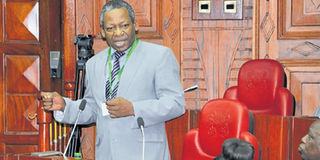Funding crisis clouds Eala sitting in Nairobi

Tanzania’s East African Legislative Assembly (Eala) lawmaker Makongoro Nyerere contributes during a session of the ongoing Eala sitting that opened in Nairobi earlier this week.PHOTO| NMG
What you need to know:
- The East African Legislative Assembly (Eala) said on Monday that the financial crunch was so severe that the assembly, a number of institutions and organs within the EAC had either cancelled or significantly curtailed their activities.
- Eala Speaker Daniel Kidega said cash remissions by member states was below budget.
Nairobi. A funding crisis that has hit the East African Community (EAC) is set to affect the sitting of the regional bloc’s legislative arm that began here this week.
The East African Legislative Assembly (Eala) said on Monday that the financial crunch was so severe that the assembly, a number of institutions and organs within the EAC had either cancelled or significantly curtailed their activities.
Eala Speaker Daniel Kidega said cash remissions by member states was below budget.
“I know generally that there is pressure on our economies, but the point of concern here is that partner states committed to contribute money equally to the integration process. But these commitments are not coming in time and therefore affecting the EAC integration process,” he said.
In the current (2016/17) financial year, Kenya has so far paid only 28 per cent of the Ksh854.5 million (Sh17 billion) that each is country is required to remit to the EAC Secretariat.
Rwanda has remitted only 23.8 per cent of the amount due, Tanzania 6.6 per cent, while Burundi has remitted nothing.
Uganda is the best performer, having paid the equivalent of Ksh760.3 million (Sh15.2 billion), or 88.9 pe rcent of the amount due.
Flanked by other Eala members at a press briefing, Dr Kidega noted that the assembly had to suspend some of its activities in September and October due to lack of funds.
The General Purpose Committee, the Committee on Communications, Trade and Investments, the Regional Affairs and Conflict Resolutions Committee, the Legal, Rules and Privileges Committee and the Select Committee against Genocide and Genocide Denial have been hit hard by the financial crisis.
Salaries and payments to EAC suppliers have also been delayed.
“I appeal to the partner states to make their full remittances by December 2016 as agreed by the Council of Ministers,” Dr Kidega said.
Eala recently passed a resolution urging the EAC heads of state to direct the Council of Ministers to fast-track implementation of the alternative sustainable funding mechanism for the EAC.
“We specifically appeal to the concerned to make sure that the directive of the summit on sustainable funding mechanism is concluded quickly to solve these problems,” said Dr Kidega.
The debate on an alternative financing mechanism for the EAC has been on the cards since 2012.
The EAC budget is still donor-dependent, just like most of member states’ national budgets. Donors have, however, been funding the development budget, leaving member states to shoulder the burden of recurrent expenditure.
The US government last committed itself to donating $194 million (Sh407.2 billion) to the EAC over five years to help development projects and deepen the integration agenda.
The Citizen understands that the money is not part of the EAC’s $101.4 million (Sh212.9 billion) budget for 2016/17 that was tabled in Arusha in May.
Donor funding was budgeted at $46.7 million, down from $58.6 million in the previous financial year.
The total EAC budget was smaller compared to the one for the 2015/16 financial year due to anticipated difficulties of remittances from member states, some of whom face serious budgetary crises themselves. The 2015/16 budget was $110.7 million.
Failure to agree on a formula for contributing on the EAC budget among member states has been partly blamed for the financial constraints.
The bloc has been negotiating for an equitable formula for determining contributions by each country to meet its budget.
Currently, member states make equal contributions to the secretariat.
The secretariat had proposed a one per cent levy on imports value for each member state to finance its operations.
The model was, however, rejected by Kenya and Tanzania, the biggest net importers, as that would mean heavier contribution from them.




